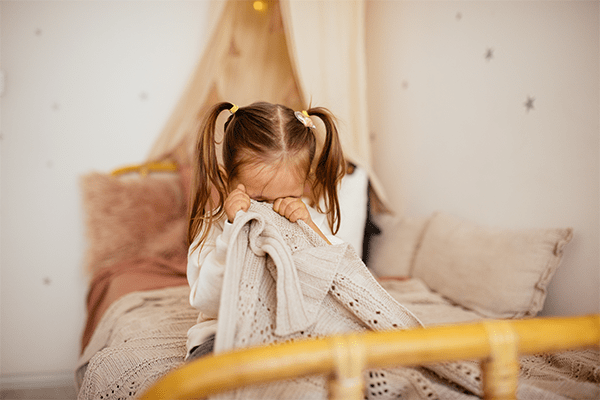Why Do Kids Wet the Bed?
Bed wetting is typically a normal stage of child development. Here’s what may be causing a child to wet the bed and how parents can help.
- 2 min read
- health & wellness

Bedwetting is a normal part of growing up. According to the American Academy of Pediatrics, around 20% of children have some issues with bedwetting until age 5. 10% of kids still have problems up to age 7, and 1-3% of children may continue to experience these problems until their late teens.
Reasons children may wet the bed
Genetics
If you and your co-parent both wet the bed as children, your kids will likely have the same issue. According to the American Academy of Pediatrics, the child has a 40% chance of having problems with bed wetting if one parent wet the bed as a child and a 70% chance if both parents wet the bed.
Growing pains
Not every child’s body develops at the same rate. The nervous systems of some children are slower to mature, so a full bladder doesn’t wake them up. Other children haven’t developed complete control over their bladder yet. Both of these make it difficult for kids to regulate when they pee, which can cause bed wetting.

Sleep issues
Bedwetting can also be an issue if your child is a very deep sleeper. Similarly, if your child is having trouble sleeping, they may fall into a deeper sleep in those rare moments when they do sleep. This can result in children not waking up when they need to pee, causing them to wet the bed.
Stress
Major changes in a child’s life, such as moving, divorce, loss of a loved one, or a new baby in the house can cause children to start wetting the bed again. Stress is one of the most common causes of secondary enuresis, which is when a child did exercise bladder control at night for a period of at least 6 months, but lost that control and started wetting the bed again.

Medical reasons
There are numerous medical reasons why a child might suddenly start wetting the bed such as a urinary tract infection, constipation, a hormonal imbalance, a small bladder, or in rare cases, conditions such as diabetes.
How to handle bed wetting
If your child is having trouble with bed wetting, you and your co-parent can try these tips from the American Academy of Pediatrics:
- Limit caffeinated and sugary drinks and avoid salty snacks, particularly at night.
- Encourage your child to go to the bathroom at regular intervals throughout the day and just before bed.
- When your child goes to sleepovers or overnight camps, send them with disposable underwear with boxers to go over them.
Having an open, honest conversation with your child’s pediatrician about bed wetting can help you and your co-parent rule out any medical causes. Bedwetting almost always goes away on its own, but there are other treatments your doctor may recommend, such as bedwetting alarms or medications.